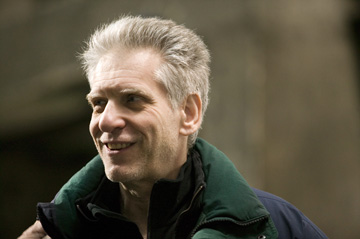 (Impressions from a Thursday, October 11th cocktail reception at Il Cielo in Beverly Hills.)
(Impressions from a Thursday, October 11th cocktail reception at Il Cielo in Beverly Hills.)
SPOILERS FOR EASTERN PROMISES DIVULGED!
David Cronenberg does not look back. He may appreciate the multitude of plaudits he receives to this day for classics like Dead Ringers, The Fly, The Brood, Videodrome and The Dead Zone, but he is too busy moving forward to measure them against his current work. And he is quick to point out that his films have always gone heavier on dialogue and theme than gore.
But when you tell him he just directed one of the great fight scenes in film history, he beams. And then he tells you how he pulled it off in two days, how he didn’t storyboard, how he composes in the moment, how Viggo Mortensen gamely took his lumps getting slammed about the unforgiving tile, how he still doesn’t understand why some nutjob chose to obsess on Viggos testicles even though they’re really only glimpsed in passing, and that he believes nude male combat is just a ten minute pop cultural fascination.
Cronenberg may have bid farewell to horror, but he is incredibly appreciative of the commercial cachet he’s earned from working within the genre. And while he may not dwell on these films now that American critics are finally treating his movies with the respect they deserve, he is fiercely protective of them. He admits that it may be hypocritical to object to remakes when one of his greatest commercial successes, The Fly, is a remake, but he so thoroughly personalized the concept that it is practically indistinguishable from its inspiration. And while he acknowledges the possibility of a young filmmaker connecting with the material as fully as he did, he is doubtful given the current state of horror.
While Cronenberg expresses scant interest in Saw or Hostel, he does speak warmly of Guillermo Del Toro. But he assumes the tone of mentor when referring to Guillermo. There’s a been there-done that inflection, as if to say "Wait ’til you burn out on this shit, Guillermo, because you will burn out on it. And then we’ll find out what kind of filmmaker you are." To that end, he admits to thinking about the progress of his genre contemporaries (e.g. Carpenter, Landis, De Palma), but he doesn’t see many movies these days.
Cronenberg’s preference, at present, is literature. If anything is turning him on cinematically, he’s keeping it to himself. He mentions a Russian film he watched prior to making Eastern Promises, but dismisses the notion that Russian cinema influenced the aesthetic of his film.
Though some have expressed dissatisfaction with the unrequited sexual tension between Viggo and Naomi Watts in Eastern Promises, Cronenberg counters that there was a sex scene in an earlier draft of Steven Knight’s screenplay; it was at the midway point of the story, and also included a post-coital confession from Viggo’s character as to his undercover cop status. To hear Cronenberg tell it, the sex made for a far more conventional tale than the "brushing past" resolution of the relationship in the finished film. He has a point. And maybe that’s a problem inherent in Knight’s screenplay: Viggo’s character can only be so dangerous.
Also in Knight’s original script, the baby is sent to live with its grandmother in Siberia. This was intended to be a happy ending. Cronenberg insisted on a change.
Speaking to the end of A History of Violence, Cronenberg does not believe the marriage lasts much beyond the final scene. But he’s fine with interpretations to the contrary.
Cronenberg is pleased that Paul Haggis’s Crash was retitled Collision in France.
Finally, Cronenberg may act again. When asked if that performance might come in Nightbreed 2, it is a testament to his zen calm that Devin Faraci is not dead.